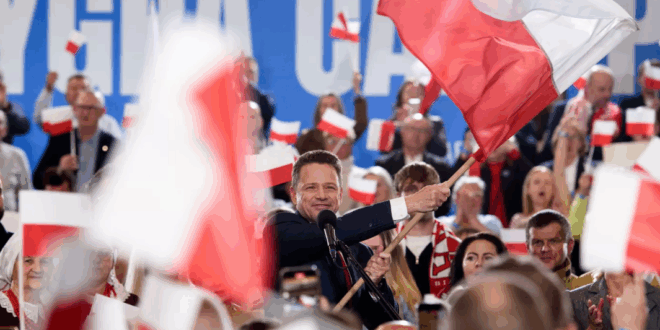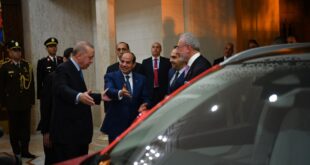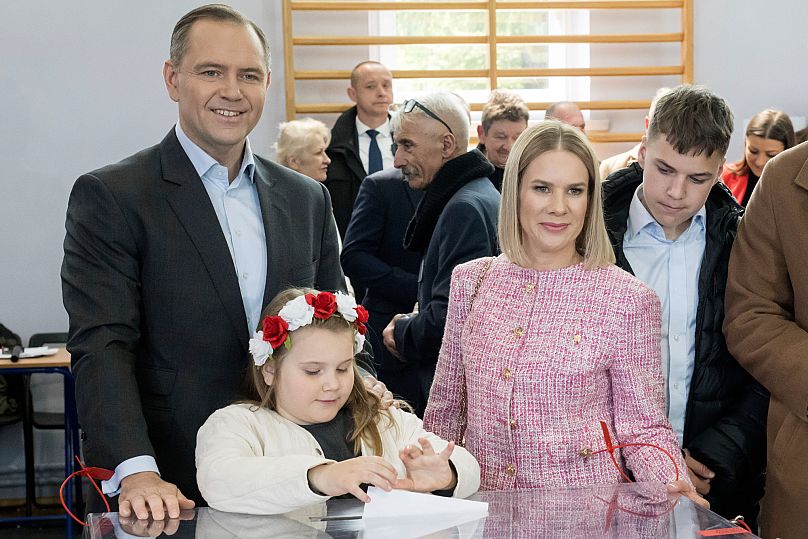Muhamad Yehia .. Cairo
According to preliminary exit polls, the mayor of Warsaw Rafał Trzaskowski won the first round of the presidential election in Poland on Sunday, followed by Karol Nawrocki. The two politicians will face each other in the second round on 1 June.
Poland’s Ruling Civic Platform (PO) coalition candidate Rafał Trzaskowski won the presidential election first round, according to preliminary exit polls on Sunday night.
Trzaskowski has won 30.8% of the vote, while the second place went to PiS-backed candidate Karol Nawrocki, who won 29.1%, the poll prepared by Ipsos on behalf of TVP, TVN and Polsat showed.
According to a separate poll by the Nationwide Research Group (NRG) for Telewizja Republika, Trzaskowski won 31.6% while Nawrocki won 29.8%.
The two candidates will now face each other in the presidential vote runoff, which will take place on 1 June
Slawomir Mentzen has come in third, with 15.4% of the vote according to the Ipsos poll and 14% according to the NRG one.
Thirteen candidates took part in the first round of the election: 11 men and two women.
Turnout, incidents and results
During a press conference at 6:30 pm, the State Election Commission reported that the turnout had reached 50.69% by 5 pm
By comparison, the turnout in the previous presidential election in 2020 in the first round was 64.5%.
Just over 28 million people are eligible to vote in Poland.
On Monday and Tuesday, the State Election Commission will report on turnout and results at press conferences.
If the turnout is high, we will have to wait up to two days for the official election results. The chairman of the State Election Commission said he hoped to announce the election results late on Monday evening or at night.
So far there have been three incidents during the Sunday vote. Two elderly people died at polling stations in Szczecin and Bielsko-Biała.
“Of the incidents worth noting, it appears that today an aggressive man barged into a polling station in the Bielsko-Biała precinct and started a brawl with other people. As a result of the brawl, he bit one of the committee members on the left forearm,” Sylwester Marciniak, head of the State Election Commission, informed the conference.
Campaign and controversy
The election campaign, which officially lasted from 15 January until Friday, was fraught with numerous contentious topics. The main axes of discussion between the candidates were security, migration, defence, the economy, the war in Ukraine, social issues, abortion, relations with the European Union and the United States. There were also presidential debates on public television and private media.
The controversy of the campaign’s last days was the case of Nawrocki’s purchase of a flat. His counter-candidate’s staff argued that it had taken place in violation of the law and decency: the owner of the flat had been placed in a nursing home and Nawrocki was said not to be interested in it, despite an earlier commitment to do so.
“I would have done exactly the same thing,” he said. “Regardless of whether I cared for Mr Jerzy or not, and I did care for him, I acquired this flat in a legal manner,” Nawrocki added, commenting on the case.
Trzaskowski, in turn, had to explain his election spots prepared by the NGO Akcja Demokracja, which is sympathetic to him. The PO candidate distanced himself from the matter, claiming that neither he nor his staff had ordered the ads.
Other candidates dropped out of the presidential race, such as the pro-Russian Maciej Maciak, journalist Krzysztof Stanowski, who said he was running out of curiosity, or the far-right and anti-European Grzegorz Braun.
The left went into the election divided, fielding two active politicians: deputy speaker of the Senate Magdalena Biejat and co-leader of the Together Party Adrian Zandberg, and former vice-president of the Democratic Left Alliance and MEP Joanna Senyszyn.
 موقع وجه أفريقيا موقع وجه أفريقيا هو موقع مهتم بمتابعة التطورات في القارة الأفريقية
موقع وجه أفريقيا موقع وجه أفريقيا هو موقع مهتم بمتابعة التطورات في القارة الأفريقية




